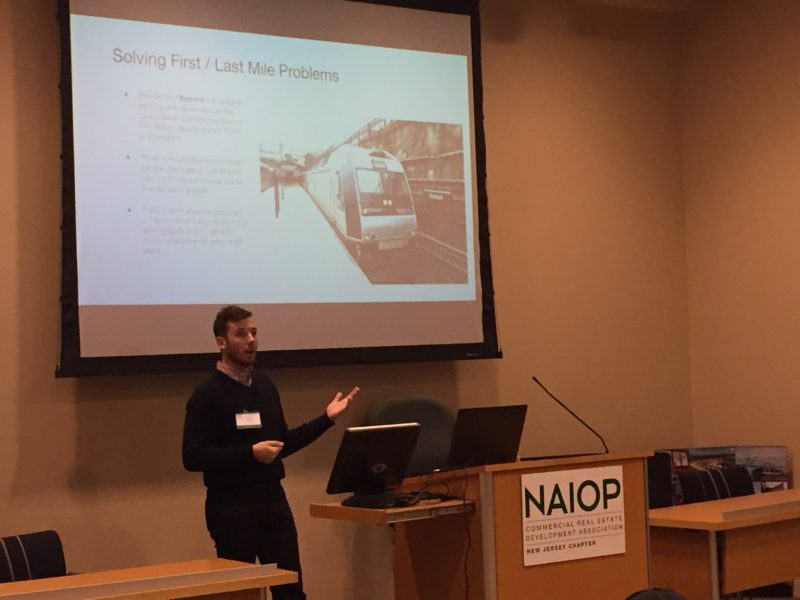By Joshua Burd
Uber may have unveiled a new partnership with a New Jersey developer earlier this week, but it’s just one of the steps that the ridesharing service has taken — and is planning for the future — to work hand in hand with the real estate industry and other business sectors.
A company official detailed some of those other affiliations last week, speaking directly to a crowd of NAIOP New Jersey members and professionals in Elizabeth.
Matt Powers, a general manager for Uber in New Jersey and Connecticut, said the company has formed partnerships across the country with municipal governments, health care providers and courier services, among others. Some of those platforms already exist in the Garden State, while others have been implemented elsewhere and could find their way here in the coming years.
For instance, Uber recently announced the state’s first ridesharing commuter program with the city of Summit, allowing residents with prepaid parking permits to take free rides to and from the station during weekday commuting hours. Those without permits will be eligible for $2 rides each, the equivalent of paying for a daily parking spot, with the city subsidizing the cost.
“It’s really great to see places like Summit, who are embracing this new technology and this new way of moving around, to try to alleviate some of the problems that they have,” Powers said, speaking during NAIOP New Jersey’ s annual Transportation & Logistics Update on Dec. 6. He noted that the deal will also save city taxpayers an estimated $5 million over the next 20 years.

Uber has struck other partnerships in the past year “around solving first- and last-mile problems,” he said, including a deal to provide rides for patients, staff and others at Hackensack University Medical Center. It also has teamed with four towns — Evesham, Summit, Voorhees and Hackensack — to provide subsidized rides on weekends for residents who patronize local bars and restaurants, in an effort to reduce drunken driving arrests and fatalities.
But it’s one of the ridesharing service’s newest agreements that may hit closest to home for real estate professionals. On Monday, Uber announced a partnership with Capodagli Property Co., under which new tenants at the firm’s apartment properties will get a $100 Uber credit.
The move is designed to reduce tenants’ reliance on automobiles at five of Capodagli’s Meridia-branded properties — in Linden, Bound Brook, West New York, Hackensack and Rahway.
“Our partnership with Uber is going to be a great convenience for tenants living in Meridia’s already transit-friendly communities,” George M. Capodagli, CEO of Capodagli Property Co. said in a prepared statement. “Offering the first of its kind Uber designated pick-up/drop-off zones and rapid, round-the-clock Uber availability are a big part of what makes downtown living an attractive option for more and more people throughout New Jersey.”
Powers did not reference the deal with Capodagli during his presentation to NAIOP New Jersey, but cited similar arrangements with developers in other markets. In San Francisco, a builder has seemingly tried to eliminate parking altogether, instead offering bike storage, a waiting lounge for Uber users and a $100 monthly transit subsidy that is offered to residents in lieu of having a vehicle on the property.
The subsidy includes $30 that is dedicated to Uber rides.
“This is trying to convince residents to not have their vehicle on the premises or, instead of having two vehicles, reducing it down to one,” Powers said. “When they did build the building, they went from their traditional two parking spots per unit, down to one.”
He said reducing parking requirements at residential and commercial buildings can be very appealing to developers because space constraints often lead to structured parking, which can cost upwards of $25,000 per space.
Powers detailed other services that have been implemented in markets outside the Garden State, including the meal delivery service known as UberEATS. The company has also explored partnerships that help augment courier services and public transportation networks.
Uber’s software “can be applied to a number of different things” besides simply “connecting a rider with a driver to get from point A to a point B,” he said. It’s why the company has only scratched the surface in providing services in New Jersey and elsewhere.
“I will say that Uber is still a relatively young company,” Powers said, noting that it has only been in New Jersey for about three years. “So as we continue to expand our footprint, there’s a number of different things that we’ll be able to do and that’s really the most exciting part — Uber does have a part to play.”









